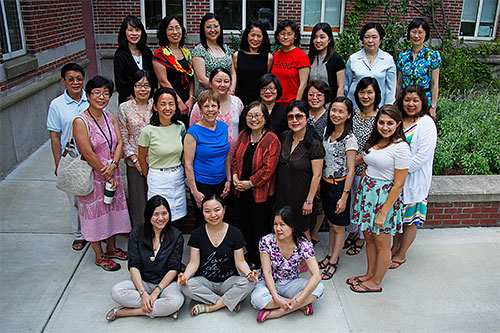 Holy Cross has been awarded a $90,000 STARTALK grant to convene a 10-day summer residential program on literacy development in Chinese as a foreign language (CFL). This is the third year in a row that the College has received STARTALK funding for this program. STARTALK programs are a component of the National Security Language Initiative, aimed at expanding and improving the teaching and learning of ‘critical languages,’ strategically important world languages that are not widely taught in the United States. The program will run July 21-31, 2014.
Holy Cross has been awarded a $90,000 STARTALK grant to convene a 10-day summer residential program on literacy development in Chinese as a foreign language (CFL). This is the third year in a row that the College has received STARTALK funding for this program. STARTALK programs are a component of the National Security Language Initiative, aimed at expanding and improving the teaching and learning of ‘critical languages,’ strategically important world languages that are not widely taught in the United States. The program will run July 21-31, 2014.
The proposal was authored by Claudia Ross, professor of Chinese in the department of modern languages and literatures, and she will serve as the program director. The leadership team also includes Baozhang He, associate professor of Chinese in the department of modern languages and literatures, who will serve as the program coordinator, and Dr. Meng Yeh, associate director of the Center for the Study of Languages at Rice University, who will serve as the instructional lead. The program will begin with workshops led by two leading researchers in the field of Chinese literacy development, Dr. Michael Everson, professor emeritus at the University of Iowa, and Dr. Helen Shen, associate professor of Chinese at the University of Iowa.
"STARTALK grants are very competitive, and we are thrilled to have received funding three years in a row," says Ross. "Holy Cross is one of only 40 STARTALK-funded Chinese teacher training programs in the country and the only one in the state of Massachusetts."
Literacy acquisition is the most challenging part of learning Chinese says Ross. There are three main difficulties. Characters: the unit of Chinese writing, the character, reflects meaning rather than systematic pronunciation, and learners have to know 5000-7000 characters in order to read a newspaper. Word boundaries: most Chinese words consist of two or more characters, but in a Chinese text, characters are evenly spaced on the page so that word boundaries are not apparent. Spoken-written divide: formal written texts use vocabulary and grammatical features that do not occur in contemporary speech. Learners cannot simply transfer over what they know about the spoken language when they read a Chinese text.”
There have been many studies of Chinese literacy acquisition among first and second language learners of Chinese, but the findings have not made their way into the CFL classroom in any systematic way. The goal of the Holy Cross STARTALK literacy program has been to use research findings to develop ‘best practices,’ effective instructional strategies for teaching students how to read Chinese.
As in the past, participants at this year’s program will be 25 Chinese language teachers representing U.S.-based Chinese programs from kindergarten through college. Together, they will study research on literacy acquisition among first and second language learners of Chinese, they will apply research findings to develop best practices in Chinese literacy instruction for learners at different grade-level groups, and they will design teaching modules that illustrate the application of these practices in the classroom. These modules, as well as reading lists and summaries of research on Chinese literacy acquisition and recommended best practices in literacy instruction will be located on the project's website.
Media Coverage
- GoLocalWorcester, June 3: Holy Cross Receives STARTALK Grant for Third Year in a Row